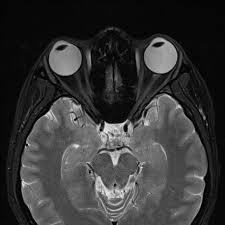Book an Appointment
MRI Orbits scan
An MRI orbit scan, also referred to as an orbital MRI scan, is a type of MRI that creates highly detailed pictures of the eye sockets as well as surrounding organs using radio waves and powerful magnetic fields.
Medifyhome has collaborated with pathology labs and NABL certified diagnostic centers to provide a wide range of pathology and radiology tests at affordable prices. It can help in identifying a wide range of issues, including Tumors, infections, soft tissue pathologies, fractures, Hemorrhages. Uses the best equipment and available customer support 24/7. Our staff has advanced education and qualifications. Medifyhome offers services including ECGs, CT scans, and MRI scans at affordable costs. To book an appointment for an MRI Orbits scan go through Medifyhome or call us at +919100907036, +919100907622.
What is the purpose of MRI orbit?
An MRI of the orbits is mainly performed to evaluate the orbital structures surrounding the pupil of the eye. A number of situations are investigated with this kind of imaging, including:
1.Masses in orbit or tumors:
Moderate tumors: These include lymphoma, dermoid cysts as well, orbital hemorrhage, optic nerve brain tumors, lacrimal gland tumors, and cave hemangiomas.
Malignant tumors: This include orbital tumors, melanomas of lymphoma, sinonasal cancer, and other diseases of the orbits.
These cancers, along with other neurogenic cancers that are located in the orbit or impact the optic nerve.
2.Conditions that are Infectious and Inflammatory:
Orbital cellulitis: MRI is crucial for identifying infections inside the orbit and determining how far they have spread to adjacent areas such as the brain or sinuses.
Orbital pseudotumor: This is a form of chronic infection of the orbital tissues that can cause abnormalities in vision, proptosis, and eye pain.
Thyroid-Related Orbital Disease (Graves’ Orbitopathy): MRI helps in the evaluation of proptosis, changes in orbital fat, and expansion of the extraocular muscles.
- Trauma Assessment:
Orbital fractures: An MRI can be used to evaluate soft tissue damage carried on by orbital fractures.
Post-traumatic complications: Magnetic resonance imaging (MRI) is used to evaluate damage to soft tissues, including as muscles, nerves, and blood vessels, following an orbital or ocular trauma.
- Disorders of the Optic Nerve:
optic neuritis: which is often associated with symptoms of multiple sclerosis or other neurological conditions an MRI is necessary to evaluate the inflammatory processes occurring in the optic nerve.
Tumors of the optic nerve: On the basis of optic neuropathy or cancer, MRI helps in the identification of any swelling, compression, or masses affecting the optic nerve.
Even though MRI cannot directly diagnose papilledema, it can detect its cause, such as internal tumors in the skull.
5.Abnormalities of the Vascular System:
Orbital venous abnormalities: Vein abnormalities and vascular conditions such as carotid-cavernous wounds can be detected with great sensitivity using magnetic resonance imaging.
Orbital arteriovenous defects: abnormal vascular connections can be seen with MRI and MR angiography.
Indications for MRI of the Orbit
In the following cases, an MRI of the orbits might be recommended:
1.Eye Bulging : Magnetic Resonance Imaging (MRI) may help in identifying if the proptosis is caused by vascular abnormalities, orbital tumors, or thyroid eye illness.
- Vision Changes: Double vision, eye pain, or chronic vision loss may be indicators of optic nerve or orbital pathology.
- Orbital Mass: An orbital mass or lump is any chronic lump or mass in the orbital region, especially if it is accompanied by symptoms like swelling or redness.
4.Eye Trauma: Post-traumatic assessment of the orbit, particularly in cases where orbital hemorrhages, fractures, or muscle trapping are detected.
5.Chronic Eye Infections: Eye infections that repeat or remain, such as dental abscess, sinusitis, or orbital cellulite.
6.Pathology of the Optic Nerve: Tumors, neuropathy, or optic neuritis.
7.Thyroid-Related Eye disease: To evaluate Burns’ disease or thyroid eye disease (TED), which affects the orbit’s muscles or fat.
8.Neurological Symptoms: Headaches, diplopia, or other neurological symptoms that could be associated with brain or orbital pathology .
Benefits of MRI for Orbit imaging:
- Improved soft tissue contrast: MRI is better to CT for imaging soft tissues, including muscles, nerves, and optical tissues.
- Non-invasive: MRI doesn’t require ionizing radiation, in contrast to CT, which is particularly useful when repeat imaging is needed, as in the case of young patients or ongoing conditions.
- careful inspection of the surrounding structures: When disorders affecting the orbit may spread outside of it, magnetic resonance imaging (MRI) is essential for providing an accurate assessment of the brain, neck, and sinuses.
MRI’s limitation in orbit imaging
- Cost and accessibility: The use of MRI in regular orbital imaging operations may be restricted since it is generally more costly and less accessible than CT.
- Time-consuming: Because MRIs typically take longer than CT scans, they are less helpful in situations where time is of the importance.
- Metal artifacts: If a patient has metal implants, an MRI could not be possible or might produce results that are inaccurate.
- Test Type: MRI Orbits
- Preparation:
- Wear a loose-fitting cloth
- Fasting not required
- Carry Your ID Proof
- Prescription is mandatory for patients with a doctor’s sign, stamp, with DMC/HMC number; as per PC-PNDT Act
- Reports Time: With in 3-4 hours
- Test Price: Rs.4000
How to book an appointment for an MRI Orbits scan ?
To book an appointment for an MRI Orbits scan go through Medifyhome or call us at +919100907036, +919100907622.
What are orbits in MRIs?
An MRI orbit scan, also known as an orbital MRI scan, is a kind of MRI that uses strong magnetic fields and radio waves to provide highly detailed pictures of the surrounding organs and eye sockets.
How long does an MRI Orbits scan take?
It takes approximately 45 minutes to complete the scan.
What does an MRI confirm ?
MRI confirms such as tumors,including cancer, soft tissues injuries such as damaged ligaments.
Is an MRI scan painful?
No, MRI is a non -invasive imaging technology, you may feel discomfort for lying on bed.
What is an MRI scan used for?
MRI scan is used for brain imaging, joint and muscle assessment, abdominal imaging.
Why Choose Medifyhome for MRI Orbits ?
Medifyhome has collaborated with pathology labs and NABL AND NABH certified diagnostic centers to provide a wide range of pathology and radiology tests at affordable prices. Our professional staff has advanced education and qualifications. We provide the best services, including home-based care, ambulance service, and testing and offers services including ECGs, CT scans, and MRI scans at affordable costs. Available 24/7 customer support and uses the best equipment. To book an appointment for an MRI Orbits scan go through Medifyhome or call us at +919100907036, +919100907622.





